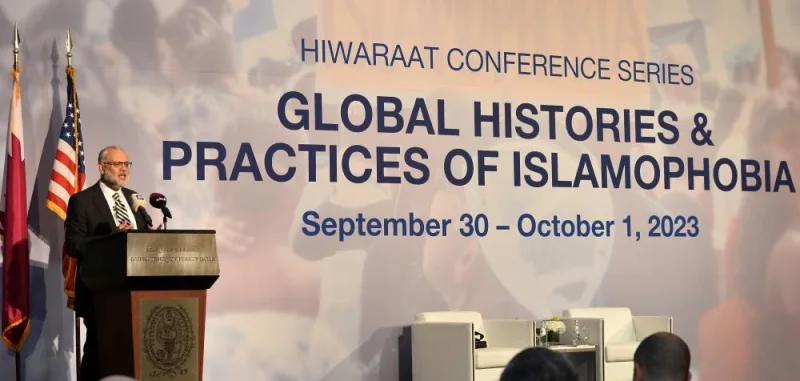There should be solidarity in the global fight against Islamophobia and other forms of discrimination, bigotry, and racism, noted a renowned speaker Saturday.
“We create isms and phobias for every difference. We dress it up as an anxiety of the unknown, activating the surveillance state, sophisticating punishments at every event, and perfecting the policies of immigration, as if they are normal laws that we need to implement. All of those things have morphed into what today can only be described as mainstream extremism,” said ambassador, Ebrahim Rasool, founder of the World for All Foundation.
Ambassador Rasool was delivering the keynote address at Georgetown University in Qatar (GU-Q)’s “Global Histories and Practices of Islamophobia” conference- part of the Hiwaraat Conference Series- that got underway at Four Seasons Hotel Doha.
In response to the growing global apprehension surrounding the surge in anti-Muslim bias and hate-related incidents, the conference is examining Islamophobia and its rampant discourse in political, social, educational, and other contexts.
“When you call it a fear, a phobia, you place the burden on the victim. It is a double burden, to survive discrimination and to prove that they are not so fearful,” continued, ambassador Rasool.
He explained: “The “Muslim other” in today’s world has special treatment. Because almost 10% of every Western country is composed of the “other.” There is no longer any mono-cultural phenomenon in the West; 25% of the Muslim community globally find themselves in conditions of being a minority.”
“Islamophobia is no longer a Western phenomenon. It has taken root where there are Muslim minorities in India, China, Myanmar, and other places. Whether in the West or the East, they are confronted with all manners of populisms and mainstream extremisms,” noted the scholar.
Drawing lessons from South Africa’s anti-apartheid struggle, he spoke on the need for solidarity in the fight against all forms of bigotry, a solidarity that transcends religion, race, and ethnicity, and to find common cause.
“The heroes we need today are those who can find the anti-human in the anti-Muslim. Those who can avoid the temptation to Muslim exceptionalism so that we can build bridges to other victims as well, while resisting the Islamophobia against them. Those who can recognise common pain, common empathy, and common cause with other victims and not denigrate, by duplication, their suffering as Blacks, Latinos, or as other victims of bigotry and domination. And who can build, out of sheer pain, a mighty solidarity.”
Responding to questions about the role of diplomacy and sport in confronting Islamophobia, ambassador Rasool said that public diplomacy, of the kind that Qatar showcased through hosting the FIFA World Cup 2022 was very effective in combating anti-Islamic sentiment.
Dr Abdullah al-Arian, associate professor of history at GU-Q and a conference co-organiser, said: “Islamophobia continues to exhibit disturbing and destructive features that are both globalised, in the sense they are becoming increasingly universalised, and at the same time deeply rooted in local beliefs and practices emerging out of particular historical and lived experiences.”

Ambassador, Ebrahim Rasool speaking at the conference. PICTURES: Shaji Kayamkulam

A section of the audience at the event.

